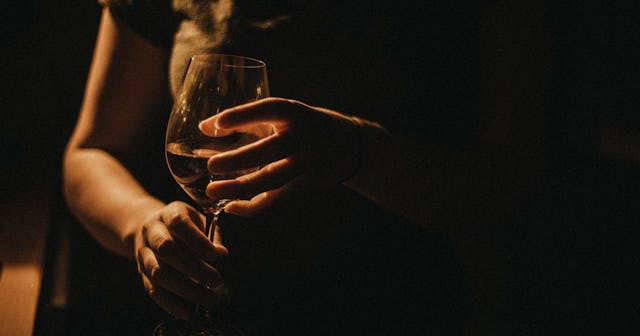I Use Alcohol To Self-Medicate My Mental Illness

It’s 1:03pm and I’m already itching for a drink. I don’t consume alcohol often, but today I want to. I need to. The pain is just too great. Why? Because I live with an illness — a mental illness — and sometimes my medication doesn’t work. Sometimes, I am anxious and apathetic, hurt and sad, and sometimes I don’t know why and I don’t know how to cope. So I turn to the bottle to tune out and zone out. To silence the voices and negativity. To numb the pain.
Of course, I am not proud of this fact. I am a strong woman, one who has endured a lot of shit over the last 35 years. I’m also a wife, employee, advocate, and mom. Being a part-time alcoholic is not in my job description. But the truth is, I am. I use beer and small-batch booze as a crutch, so I can function and limp along, and I do so because my brain is a shitshow. There is a war raging in my mind. I also hate myself, at least to a certain degree, though most alcoholics do. There is restlessness, uneasiness, unhappiness, and discontent.
So I self-medicate my mental illness to slow things down. To make the “shit” stop. I self-medicate my mental illness because when I am drunk, I am numb. There is no feeling. There are no thoughts. And I self-medicate my mental illness because I need to be medicated. Bipolar disorder is one hell of a condition, and something needs to give. When my scripts aren’t working, something needs to budge. But the real reason why I drink is the voices — the tapes that play on repeat inside my brain — because these voices are angry. They are hateful and mad, and these voices tell me I’m not good enough. I’m not smart enough. I’ll never be enough.
No one loves me.
No one cares.
Of course, these voices tell me other things, too. They yell at me when I am silent — and for speaking up. They criticize me constantly. I’m convinced no one wants to hear about my life, feelings or otherwise. These voices tell me my thoughts are insignificant. No one cares. And the tell me I should kill myself, frequently. They are the masterminds behind my “great escape” plan — and yes, I have one of those too. Suicide flutters through my mind like a mosquito. It’s an itch I can’t scratch. A pest I can’t kill. A gnawing thought which perpetually persists because I feel trapped. Stuck. I am cycling, a victim of addiction and mental illness, trauma, depression, and abuse.
The good news is that I learned early on how to make the shit stop. I had to. It was a means of self-preservation and survival, especially when I was unmedicated. Alcohol masked the symptoms of my mental illness long enough (and just enough) for me to function. And it turns out I am not alone. Approximately 9 million Americans struggle with addiction and mental illness. The reason? “Many people who suffer from mental health issues slip into addiction in an attempt to self-medicate,” Dr. Indra Cidambi, the medical director and founder of the Center for Network Therapy, tells Scary Mommy.
“For example, it is estimated that 30% of people who suffer from major depressive disorder do not benefit from antidepressants and many turn to street drugs or alcohol in order to address their depression.” People like you. People like me. But I don’t just drink when I’m depressed; I drink when I’m happy, or manic. I drink when I’m anxious, or scared. And I drink to drown out the voices, to keep the demons at bay. And yet I didn’t realize my relationship with alcohol was problematic until 2019, when a family member passed from addiction herself. Apparently, I come from a long line of users and boozers. Mental illness and addiction runs deep in my veins, and through my genes.
That said, I have no plans of stopping. Not now. Not yet. I mean, my relationship with hooch is hella problematic. I’m drinking for the “wrong reasons.” I’m playing a dangerous game. But alcohol has, in some ways, saved me. It’s gotten me through dark days and even darker nights. Without alcohol, the voices would win. I would be dead. Plus, I don’t meet the so-called standards of addiction. I have a job — and no DUIs. I’m not dead or destitute or laying face down in the bathroom, praying to the porcelain gods. And my addiction isn’t one which affects me daily. While my moods can trigger an “event,” there is life between episodes. I’m not always manic or depressed. And when I’m good, I’m good. The beer stays in the bottle. Shots are unpoured.
But someday soon, I need to have a reckoning — an awakening — within myself, because I know this behavior cannot continue. I know addiction can consume my life in a flash, and I owe my children more. I owe my friends and family more. But most importantly, I owe it to myself.